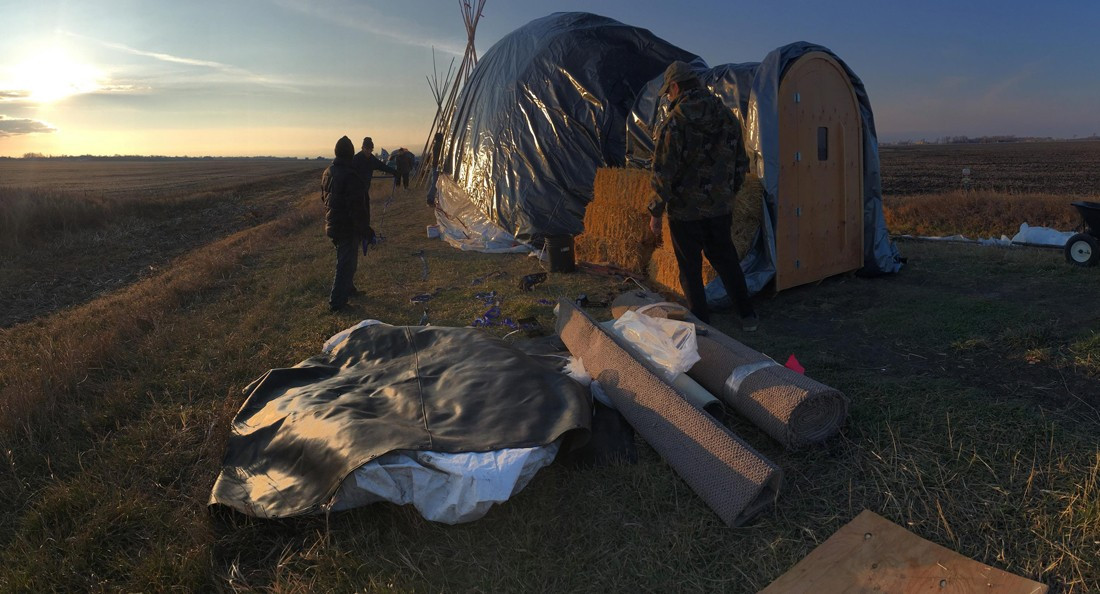Spirit of the Buffalo Camp five months strong
University of Winnipeg invested in Enbridge’s largest project to date
A few kilometres southeast of Gretna, Man. sits a spacious lodge on a dirt road, steps away from the Canada-US border. Two tipi structures next to the lodge are ready to be covered with canvas, while tents from summer shake in the wind. Smoke curls out of the lodge’s wood stove pipe into the grey sky.
Even before arriving at the door, muffled sounds of laughter and conversation emanate from inside the tarp-covered structure. Directly below the lodge, crude oil flows through Enbridge’s Line 3 pipeline, travelling from Alberta’s tar sands through the prairies to Wisconsin.
In early July this year, Geraldine McManus, a Dakota and Two-Spirit land defender, founded the Spirit of the Buffalo Camp. The peaceful prayer camp has been a gripping sign of resistance against the
Line 3 pipeline expansion.
McManus says she established the camp because “it needed to be done.” While McManus acknowledges other methods of challenging the new Line 3 construction, she emphasizes the importance of front-line action: “For me, it’s being somewhere solidly, 24-7 being in someone’s face, like the camps are.”
The existing Line 3 pipeline is corroding and defective, with numerous reported ruptures and spills since its construction in the 1960s. In 2017, Enbridge began to lay a new pipe next to the old Line 3 pipeline.
While Enbridge calls the project a “replacement,” the new pipeline will transport nearly double the amount of tar sands oil. That means 760,000 barrels of some of the dirtiest fuel in the world, the equivalent of 48 Olympic swimming pools, will travel through Manitoba every day. With an estimated minimum cost of $7.5 billion, the Line 3 expansion will be the largest project in Enbridge’s history.
“One of the big things here is to make a point of environmental injustice that’s going on around Turtle Island,” McManus says. “Here in Manitoba, there’s a lot of people that care, but by far not enough, and there’s not enough unity. Here, we build unity on the line by prayer and through education.”
Fossil fuel development propels environmental injustice in numerous ways. In particular, oil, gas and coal companies violate Indigenous sovereignty by routinely developing projects without consent from affected Indigenous communities.
Dr. Leanne Betasamosake Simpson, a Michi Saagiig Nishnaabeg writer, stresses that “extraction and assimilation go together.” The threats posed by these projects are perpetual and vast. For example, the Line 3 expansion endangers over 180 culturally significant and sacred sites, some of the world’s largest wild rice beds and numerous waterways.
Not to mention, all pipelines are more likely than not to produce oil spills within any 10-year period. The existing Line 3 pipeline was already responsible for the largest inland oil spill in US history in 1991.
International agreements call for an immediate transition away from new fossil fuel infrastructure to mitigate the current climate crisis, which disproportionately impacts Indigenous peoples and People of Colour globally. Mi’kmaq lawyer Dr. Pamela Palmater writes, “The true test of reconciliation will be whether Canada respects the Indigenous right to say ‘no.’”
The University of Winnipeg (U of W) itself has a hand in the Line 3 pipeline expansion. The University of Winnipeg Foundation, an “arms-length” organization, serves as the university’s investment wing. In 2016, the foundation invested around $600,000 in Enbridge and continues to invest in Enbridge today, while also investing in other fossil fuel giants.
“I quit university to go to Standing Rock. I still have to go finish my university at U of W. I don’t know how I feel about that,” McManus says,
“In our heart, do we know what right and wrong is? Because if we do, then universities wouldn’t be backing these companies. Then universities would be divesting.”
McManus also emphasizes how our education system must fundamentally change. “They’re teaching us to be robots,” she says. “(They’re) not teaching us to be
heartfelt leaders.”
After nearly five months of camping in the prairie’s harsh and spectacular elements, the camp is now preparing for winter. “I can’t quit. If I quit, I feel like I’m letting all you kids down,” McManus says.
McManus encourages anybody who is interested in supporting the camp to come visit. “Come out here, and even if it means cutting logs or if we’re all finished, come out here and learn, ask questions,” she says.
“We have to all try and come up with better solutions. Manitoba needs to wake up.”
Jade DeFehr is the Vice-President Student Affairs for the University of Winnipeg Students’ Association (UWSA). For updates on the camp and a list of needed donations, follow Spirit of the Buffalo Camp on Facebook. Donations can be dropped off at the UWSA General Offices on Monday to Friday from 10 a.m. to 3 p.m.
Published in Volume 73, Number 11 of The Uniter (November 22, 2018)







